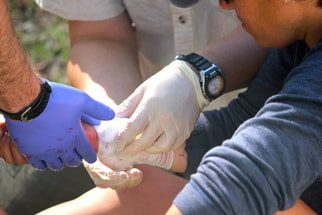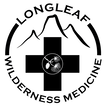 When I first walked into the classroom, the people seemed like any other wilderness medicine students – paying rapt attention to the words of the instructors as they prepared to move from a lecture to practicing skills in a scenario. Yet the questions that pepper the instructors are clearly those of people with significant medical training as they dive further into the physiology behind common medical issues seen in the wilderness and ask questions about how medical procedures used in a medical setting can be improvised in the field. Welcome to the Wilderness Medicine Elective, where fourth year medical students are spending four weeks learning how to put their medical training into practice when definitive care is over one hour away. As one of the expedition leaders for the five-day wilderness expedition component of the elective, I joined the group in the third week of their four week class, primarily working with the students to teach them how to prepare for an expedition and assisting them in packing their personal gear, their group’s food, planning their travel schedule, and learning how to canoe. It was clear that the group had bonded even more than the shared experience that medical school provides. I was interested to see how they would transfer their level of trust and support built in an intense professional environment to one that required them to mix personal and professional in the casually intense environment provided by the rivers of the Mobile-Tensaw Delta. One of the best transformations I saw take place during the expedition was watching the group transition from being solely patient focused to wisely using resources that promoted both patient care and group well-being. Acknowledging that, if not taken care of, group members, including those providing medical care, can quickly become additional patients, the medical elective students learned and practiced the necessary skills to be comfortable for extended periods in a wilderness environment. The skills included meeting personal needs such as applying sunscreen, drinking water and making sure that personal systems were maintained. Learning to manage self-care and oversee the critical personal needs of others during medical incidents proved to have a steep learning curve, but one where learnings were quickly applied. After developing and practicing their field systems for five days, their learning culminated in the field care and lengthy canoe evacuation of a “patient” with a head injury. The sense of calm, confidence and competence they portrayed throughout the five hour process was that of experienced expedition doctors. Watching their response to the scenario, listening to their ideas and communication of plans, as well as their professional and compassionate treatment of their “patient” solidified my confidence in their ability to respond to emergencies large and small in the wilderness. The wilderness medicine elective is designed to meet the needs of medical professionals who are interested in practicing medicine in remote environments, who wish to be expedition medical staff or to serve as medical directors for wilderness organizations. What that description fails to capture is the involved nature of improvisation, group care, personal care and environment management, all challenges that the students who participated in the LWM Wilderness Medicine Elective can attest to. At this point, the medical elective participants have officially completed medical school, have walked across the stage, received their diplomas and are headed towards their residency placements. We wish them the best of luck in their upcoming adventures. -Katie Cartier, LWM Program Manager
0 Comments
Leave a Reply. |
Archives
December 2020
Categories
All
|

 RSS Feed
RSS Feed
